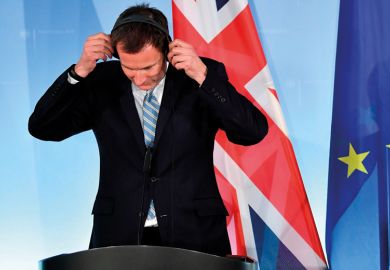Browse the full Impact Rankings 2023 results. To participate in next year’s Impact Rankings, email us
When a soundly researched idea for improving people’s lives makes its way from academia into the political mainstream and on to the statute books, it is usually a moment for celebration.
Such evidence-based policymaking is a rarity in many Western political cultures, too often driven by short-termism, opinion polls, appeasing party factions or furthering the careerist ambitions of ministers, many contend. Others, however, still see the opportunity for well directed and finely argued academic points to cut through the bluster and guide politics towards effective policies with the potential to benefit millions.
That said, transmitting the thoughts of an academic to the mouth of a minister is a daunting challenge. From perfecting a persuasive elevator pitch to influencing broader public opinion and securing long-term engagement with politicians, the obstacles to achieving political impact are immense. To shed some light on the matter, we spoke to those who understand how research and government can click effectively.
Impact Rankings 2023: results announced
With their ability to explain high-level concepts to students or research insights to fellow scholars, academics are often effective communicators. But finding the right individual in politics or government to target about action on a topic can be a difficult task.
Personal approaches to politicians can pay dividends, but unsolicited emails or phone calls might simply go unanswered. With scholars keen to offer their expertise, go-betweens linking academia and policymakers, such as the UK’s Parliamentary Office of Science and Technology (POST), can smooth the path of scholars seeking an entrance to policymaking.
Oliver Bennett, the unit’s head, says research shows that academics are deterred from engaging with Parliament because they do not understand the process. “They also mentioned how intimidating and confusing it was. And that it’s off-putting for people to engage with us,” he says.
He hopes that POST will clear the path by providing information on how academics can get involved. Academic advisers recruited by the unit can present politicians with impartial, peer-reviewed briefings, advertise the topics they are working on so that other academics can contribute and suggest future topics for briefings.
POST has also set up a “knowledge brokers” network across UK universities in which named staff members distribute news and information about parliamentary opportunities for contributing to policy, such as details about new evidence calls, upcoming select committee meetings and public events.
Based on similar bodies in the US, France and Germany, Bennett’s organisation was established towards the end of the Thatcher government amid concerns that UK science lacked a forceful voice in Westminster. The model has certainly proved popular – there are 73 equivalent bodies around the world. In some countries, the resources allocated to these organisations are impressive, says Bennett.
“The Ghanaian Parliament Research Service has got 27 research analysts, and the Pakistan Institute for Parliamentary Services has published 1,500-odd research briefings over the past few years, so they’re pretty major systems,” he says.
Although POST and its global counterparts can smooth connections between universities and politicians, academics will need to take a lead and, importantly, react quickly when opportunities arise, says Bennett.
If, say, an energy bill is going through Parliament, a scholar in this field needs to file their thoughts – with supporting evidence – when opinions are being sought, he explains. “You need to engage with that process at that point because after the legislation has gone through Parliament, it’s probably going to be some years before you get another opportunity to influence the law-making process,” continues Bennett. “You have to seize those opportunities.”
To be prepared for those openings, academics should monitor current affairs, keep an eye on party manifestos and take a close interest in rising stars or political groupings on the lookout for their next policy, he says.
Other routes into the political arena should also be considered, with many scientific societies keen to find individuals who will champion certain policies. The American Association for the Advancement of Science (AAAS)’s Center for Scientific Evidence in Public Issues (EPI Center) has fostered links with Capitol Hill over many years via its user-friendly briefings on scientific evidence.
Training scientists to consider how their research results could affect decisions has been key to this task, explains Michael Fernandez, EPI Center’s director. “Scientific associations where the engagement is planned and structured by people with more policy experience and expertise can be a powerful way to get scientists involved,” he says.
Shirley Malcom, a former scientific adviser to the White House who is now a senior adviser at the AAAS, says such science policy roles can offer interesting career opportunities. In her case, the ecologist eventually joined President Bill Clinton’s science advisory board and has held senior positions at the National Science Foundation, America’s main basic science funder, and at top universities such as the California Institute of Technology.
“As a graduate student and early career professional, no one talked to me about policy,” says Malcom. “Today, things are different – students will ask about policy, though [they] often have a poor understanding of what it entails or how they might get involved.”
Forums and workshops at the AAAS where attendees can learn more about science policy, and regular meetings with student groups on visits to Washington DC, help to offer insight into the policy process, Malcom explains.
“There are many ways that knowledge can travel into the decision-making space. Experts can provide comment within media or offer input within generally announced ‘requests for information’, which often precede rule-making,” she says.
Those efforts might not always deliver the results that researchers desire, warns Malcom. “Moving research findings into places where policy is made does not guarantee that knowledge will be used or become a factor in decision-making. But it is important the knowledge and ideas are available to be considered within the larger frame of decision-making,” she says.
For academics who really want to dive into the world of policy, a fellowship in the government could be the answer. In the UK, POST makes arrangements for scholars, usually PhD students, to spend three months with it. Alternatively, they might support a select committee or a library research team. “Often, it’s transformative for their future career,” Bennett says. “Many will go into policy-focused jobs or research communicator roles. If they don’t, they will remark how effective it makes them at communicating as an academic later in their lives.”
Fellowships organised by the AAAS can also be transformational, adds Malcom. “Fellows often recall what they did on the programme, how it affected their thinking about how research can influence decisions at federal, state, local levels and within institutions,” she adds.
Rules of engagement: insiders’ guide to getting research in front of politicians
Tailoring language to allow politicians to incorporate one’s academic work into their next speech or committee hearing appearance is a crucial but often neglected skill, says former ministerial adviser Diana Beech, who is now chief executive officer at London Higher, which represents more than 40 higher education institutions across the capital.
Politicians and civil servants constantly have to master new briefs, so they appreciate well-informed but succinct briefings, preferably spiced up with some snappy one-liners, she notes. “Using simple language and framing your approaches around something they already care about is going to help your correspondence stand out,” says Beech, who has served as policy adviser to three UK science ministers.
One mistake is to view ministers as identikit public servants whose enthusiasm for their brief knows no bounds, she continues. Instead, ministers have their own passions and ambitions, which must be considered if a connection is to be made. “Take time to find out what these are from past speeches and op-eds, and use them to tailor your approach,” says Beech.
To this end, a long list of facts might not catch the eye of a minister. A strong narrative is a better way to capture attention, says Beech. “Political careers are built on public appeal. As such, politicians seek ‘powerful’ statistics combined with impactful anecdotes that can be transformed into catchy slogans for deployment at the dispatch box or in press releases to attract public support for their policies.”
Browbeating ministers over past policy failures is also unlikely to open doors, she adds. Policies are often the end product of intense negotiations between government departments, often resulting in unsatisfactory compromises. “It is easy to point out flaws in existing policies; it is far more helpful to policymakers if you offer solutions that are short, simple and jargon-free,” she says. “Being combative is not going to get you invited to a conversation; yet being constructive will open doors to further engagement.”
Adam Graycar, a professor of public policy and director of the Stretton Institute at the University of Adelaide, has observed engagement from both sides. Having started out as a public policy lecturer, he spent two decades in senior state and federal governmental roles in Australia before returning to academia in 2007, holding professorial positions in the US, Singapore and Australia.
“When I moved to a position in government, ex-colleagues from academia would say to me, ‘How can you work with these idiots?’ What I found is that most ministers are very bright, and in 22 years of senior civil service positions I have never worked with a stupid minister,” reflects Graycar.
That mistrust is probably down to different methods of working, says Graycar, who identifies politicians’ dislike of ambivalent fence-sitting statements as an example of the gulf between the two tribes. “Academics are sometimes unwilling to make inferences. Ministers don’t want tentative or provisional statements – ‘on the one hand, and on the other, and we need more research,’” he says. As academics, “a lot of our work highlights the complexity of social issues rather than [providing] pathways to solutions. Ministers want to know what works and what will produce timely results – they want to have confidence in the results,” he adds.
Recognising the pressured context of limited political careers – in which second acts, after a defeat or a sacking, are a rarity – is important, continues Graycar. “We need to understand the interplay of [politicians’] values, parties’ habits and traditions, [and the role of] pressure groups and consultants,” he says. With ministerial budgets also constrained, “academics should not assume that evidence and research will have primacy over other factors”, he says.
Unfortunately, the dense scholarly outputs that academics have been trained to produce do not usually cut through with politicians, continues Graycar. A highly complex report with hundreds of supporting footnotes is “not likely to be read by those in government”, he explains. “When I ran a policy research agency, we had strict word limits on our policy briefs and a user-friendly template. We also produced a series of one-pagers – they contained one graph or one table and one paragraph of explanation, with a link to the research on which it was based.”
When he returned to scholarly life – as a professor at the Australian National University, not far from the Canberra parliament, Graycar ran a series of events called “Lunch with the Secretary” involving senior ministers from federal government departments. “We would invite about six academics who work in their area and asked the secretary [of state] to bring a few departmental officers. The discussion focused on what the department wanted to know, and on what research our people were doing. It was always fruitful, and led to more interaction.” Sadly, a similar initiative at a university outside the capital was less successful, he adds, suggesting that location and convenience is important.
Nonetheless, it is possible to create avenues that get research before policymakers, Graycar believes, if scholars take time to foster personal relationships. Academics should invite civil servants to relevant university seminars and follow up after the event. “I have often struck up a conversation at a conference and said to the civil servant, ‘If this interests you, I would be happy to come by your office with a couple of colleagues and kick the idea around.’”
Establishing such networks of influence might seem an insurmountable challenge, but scholars should not be intimidated, says Natascha Engel, a former Labour MP who is now head of the policy and research institute Palace Yard.
“Policymakers are hungry for interesting and original research. They want a diversity of views. They enjoy ideas and policies being challenged,” explains Engel. “Without it, when bad policy translates into bad legislation, people suffer – which is exactly what most MPs go into politics to do something about.”
Register to continue
Why register?
- Registration is free and only takes a moment
- Once registered, you can read 3 articles a month
- Sign up for our newsletter
Subscribe
Or subscribe for unlimited access to:
- Unlimited access to news, views, insights & reviews
- Digital editions
- Digital access to THE’s university and college rankings analysis
Already registered or a current subscriber?







